Bearded dragons are beloved pets known for their friendly personalities and unique appearance. However, like any other pet, they can develop odors if their environment is not well-maintained. Fortunately, with proper care and attention, you can eliminate unpleasant smells and ensure your bearded dragon lives in a clean, healthy habitat. This article dives into seven effective ideas and tips to help you get rid of bearded dragon smells and maintain a fresh enclosure.
1. Clean the Enclosure Regularly
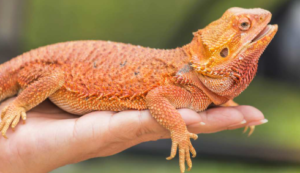
One of the primary reasons bearded dragon enclosures develop odors is a lack of regular cleaning. Food remnants, feces, and urine can accumulate in the tank, leading to unpleasant smells.
How to Clean:
- Daily Spot Cleaning: Remove any feces, uneaten food, and debris from the enclosure daily.
- Weekly Deep Cleaning: Take out all items from the tank, including substrate, decorations, and accessories. Clean them with warm water and a reptile-safe disinfectant.
- Monthly Disinfection: Sanitize the entire enclosure monthly by scrubbing it with a diluted bleach solution (10% bleach) and rinsing thoroughly with water. Let it air dry completely before returning your pet.
Consistent cleaning prevents odor buildup and keeps the enclosure sanitary.
2. Choose the Right Substrate
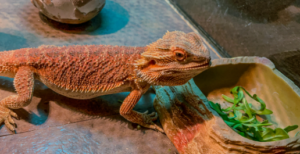
The substrate you use in the enclosure can significantly impact the smell. Some substrates, such as sand or wood chips, can trap moisture and waste, leading to persistent odors.
Recommended Substrates:
- Paper Towels: Cheap, easy to replace, and highly absorbent.
- Reptile Carpet: Washable and reusable, providing a clean and odor-free surface.
- Tile: Durable and easy to clean, tiles do not absorb odors or moisture.
Avoid loose substrates like sand or bark, as these can harbor bacteria and fungi that contribute to bad smells.
3. Maintain Proper Ventilation
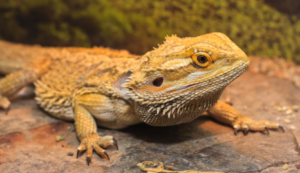
Poor ventilation in the enclosure can trap odors, creating a stuffy and unpleasant environment. Bearded dragons thrive in well-ventilated spaces.
Tips for Better Ventilation:
- Use enclosures with screen tops to allow proper airflow.
- Avoid overcrowding the tank with too many decorations, which can restrict air circulation.
- Position the enclosure in a well-ventilated room with good airflow.
- Improved ventilation not only reduces odors but also ensures your bearded dragon breathes fresh air.
4. Manage Waste Effectively
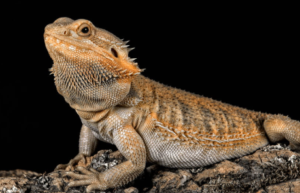
Bearded dragons urinate and defecate regularly, and improper handling of waste is a major cause of enclosure smells.
Tips for Waste Management:
- Spot Cleaning: Remove waste as soon as you see it. Waiting too long can allow odors to spread.
- Dedicated Waste Area: Train your bearded dragon to use a specific spot in the enclosure for waste. This makes cleaning more manageable.
- Use Odor Neutralizers: Safe reptile odor neutralizers can help reduce smells between cleanings.
Prompt waste removal is key to keeping the habitat fresh.
5. Bathe Your Bearded Dragon
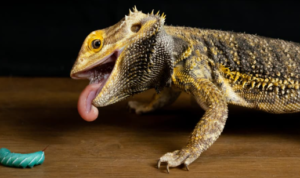
Bearded dragons themselves can emit odors if they are not cleaned occasionally. Bathing them helps remove dirt, bacteria, and food particles from their skin.
How to Bathe Your Dragon:
- Fill a shallow container with lukewarm water, ensuring the water level does not exceed your dragon’s shoulders.
- Gently place your dragon in the water and let them soak for 15–20 minutes.
- Use a soft toothbrush to gently scrub their body if needed.
- Bathing not only keeps your dragon clean but also helps them stay hydrated and shed properly.
6. Address Feeding Practices
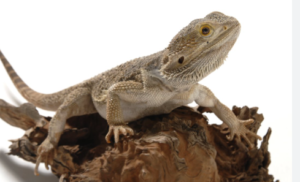
Leftover food in the tank can rot quickly, producing foul odors. Proper feeding practices can minimize this issue.
Tips for Feeding:
- Remove uneaten food immediately after mealtime.
- Feed your bearded dragon in a separate container to prevent food mess in the enclosure.
- Store live feeders (like crickets) in clean, odor-free containers to avoid transferring smells to the tank.
- A clean feeding routine ensures no food remains contribute to odor issues.
7. Check for Health Issues
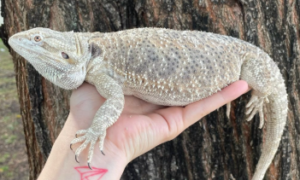
Sometimes, persistent odors may indicate an underlying health issue with your bearded dragon. For example, infections, impactions, or skin problems can produce foul smells.
Signs of Health Problems:
- Unusual odors coming directly from your dragon.
- Changes in feces consistency or color.
- Lethargy, loss of appetite, or irregular shedding.
- If you suspect a health problem, consult a reptile veterinarian immediately. A clean habitat and a healthy dragon go hand in hand.
Bonus Tip: Use Natural Deodorizers
If you’ve addressed all the factors above but still notice mild odors, natural deodorizers can help. Activated charcoal, for example, can absorb odors without harming your pet. Place it near the enclosure (not inside) for the best results.
Conclusion
Eliminating bearded dragon smells requires a combination of regular cleaning, proper ventilation, effective waste management, and attention to your dragon’s health and hygiene. By following these seven tips, you can create a clean, odor-free environment that benefits both you and your pet.
Not only will these practices improve the quality of life for your bearded dragon, but they’ll also ensure your home remains fresh and pleasant for everyone
